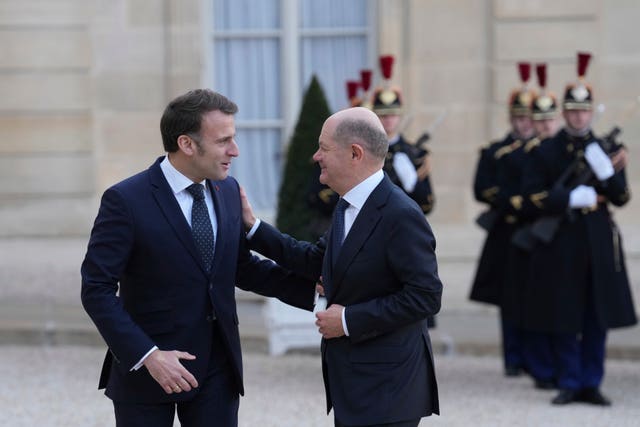European leaders hold emergency talks, fearing Trump has abandoned old allies
A US envoy underlined on Monday that Europe has no place at the negotiating table over the future of Ukraine.

European leaders have sought to form a united front at emergency talks in Paris, called after a US diplomatic blitz on Ukraine which has thrown a once-solid alliance into turmoil.
Shortly before the meeting, French President Emmanuel Macron spoke with US leader Donald Trump, but Mr Macron’s office would not disclose details about the 20-minute discussion.
Leaders of Germany, the UK, Italy, Poland, Spain, the Netherlands, Denmark and the European Union met at the Elysee Palace for talks on Europe’s security quandary. Nato secretary general Mark Rutte was also there.
Since last week, senior US officials on their first visit to Europe have left the impression that Washington is ready to embrace the Kremlin while it cold-shoulders many of its age-old European allies.

General Keith Kellogg, President Trump’s special envoy for Ukraine and Russia, underlined on Monday that Europe has no place at the negotiating table.
“All their concerns will be known, and addressed as well,” he told reporters in Brussels, where he briefed the 31 US allies in Nato, along with EU officials, before heading to Kyiv for talks on Wednesday with Ukrainian President Volodymyr Zelensky.
“I don’t think it’s reasonable and feasible to have everybody sitting at the table. We know how that can turn out and that has been our point… keeping it clean and fast as we can,” he said.
US vice president JD Vance and defence secretary Pete Hegseth last week questioned Europe’s security commitments and its fundamental democratic principles.
Mr Macron, who has long championed a stronger European defence, said the stinging rebukes and threats of non-cooperation in the face of military danger felt like a shock to the system.
The tipping point came when Mr Trump decided to upend years of US policy by holding talks with Russian President Vladimir Putin in hopes of ending the Russia-Ukraine war.
German Chancellor Olaf Scholz told reporters a possible peace agreement with Russia cannot be forced on Ukraine from outside.
“We welcome the fact that talks are taking place, that peace is developing everywhere. But for us it must and is clear: this does not mean that peace can be dictated and that Ukraine must accept what is presented to it,” he said after he left the Elysee Palace, as the meeting was continuing.
“Negotiations are moving fast with Europe,” Mr Zelensky said in a virtual news conference on Monday in Kyiv, adding recent US moves “accelerated everything”.
He said Mr Macron had agreed to provide him with a briefing on the conclusions from the meeting in Paris.
A strong US component will remain essential for the foreseeable future since it will take many years before European nations can ratchet up defence production and integrate it into an effective force.
That US bond also applies to dealing with war in Ukraine, said UK Prime Minister Sir Keir Starmer. “US support will remain critical and a US security guarantee is essential for a lasting peace, because only the US can deter Putin from attacking again,” he wrote.
He appears to be charting a “third way” in Europe’s shifting geopolitical landscape, aligning strategically with Mr Trump while maintaining EU ties. Some analysts suggest this could allow him to act as a bridge between Mr Trump and Europe, potentially serving as a key messenger to the White House on his visit to Washington DC next week.
While many EU nations are still mulling whether to contribute troops to a potential force in Ukraine after a peace deal, Sir Keir said the UK was “ready and willing to contribute to security guarantees to Ukraine by putting our own troops on the ground if necessary”.
Mr Macron last year refused to rule out sending western troops into Ukraine if necessary.
“A ceasefire must not lead to Russian rearmament, which is followed by new Russian attacks,” warned Danish Prime Minister Mette Frederiksen ahead of the Paris meeting.
But Mr Scholz: “It is completely premature and completely the wrong time to have this discussion now. I’m even a little irritated by these debates.” He added that peace talks “have not taken place and… Ukraine has not said yes and has not sat at the table”.
“This is highly inappropriate, to put it bluntly and honestly: we don’t even know what the outcome will be,” he added.





